The AMD Ryzen 3 1300X and Ryzen 3 1200 CPU Review: Zen on a Budget
by Ian Cutress on July 27, 2017 9:30 AM EST- Posted in
- CPUs
- AMD
- Zen
- Ryzen
- Ryzen 3
- Ryzen 3 1300X
- Ryzen 3 1200
Benchmarking Performance: CPU Encoding Tests
One of the interesting elements on modern processors is encoding performance. This includes encryption/decryption, as well as video transcoding from one video format to another. In the encrypt/decrypt scenario, this remains pertinent to on-the-fly encryption of sensitive data - a process by which more modern devices are leaning to for software security. Video transcoding as a tool to adjust the quality, file size and resolution of a video file has boomed in recent years, such as providing the optimum video for devices before consumption, or for game streamers who are wanting to upload the output from their video camera in real-time. As we move into live 3D video, this task will only get more strenuous, and it turns out that the performance of certain algorithms is a function of the input/output of the content.
All of our benchmark results can also be found in our benchmark engine, Bench.
7-Zip 9.2: link
One of the freeware compression tools that offers good scaling performance between processors is 7-Zip. It runs under an open-source licence, is fast, and easy to use tool for power users. We run the benchmark mode via the command line for four loops and take the output score.
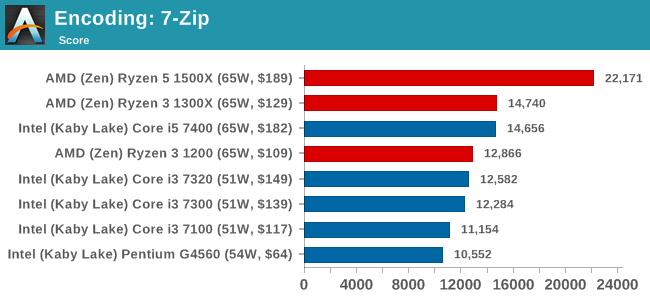
WinRAR 5.40: link
For the 2017 test suite, we move to the latest version of WinRAR in our compression test. WinRAR in some quarters is more user-friendly that 7-Zip, hence its inclusion. Rather than use a benchmark mode as we did with 7-Zip, here we take a set of files representative of a generic stack (33 video files in 1.37 GB, 2834 smaller website files in 370 folders in 150 MB) of compressible and incompressible formats. The results shown are the time taken to encode the file. Due to DRAM caching, we run the test 10 times and take the average of the last five runs when the benchmark is in a steady state.
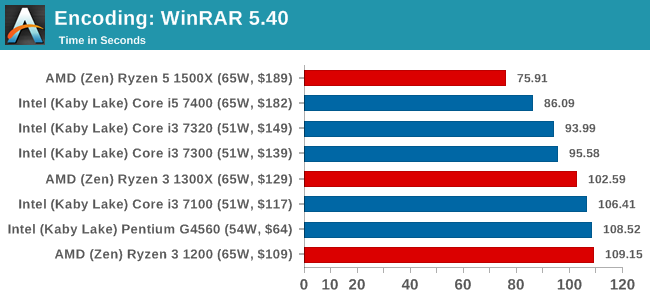
AES Encoding
Algorithms using AES coding have spread far and wide as a ubiquitous tool for encryption. Again, this is another CPU limited test, and modern CPUs have special AES pathways to accelerate their performance. We often see scaling in both frequency and cores with this benchmark. We use the latest version of TrueCrypt and run its benchmark mode over 1GB of in-DRAM data. Results shown are the GB/s average of encryption and decryption.
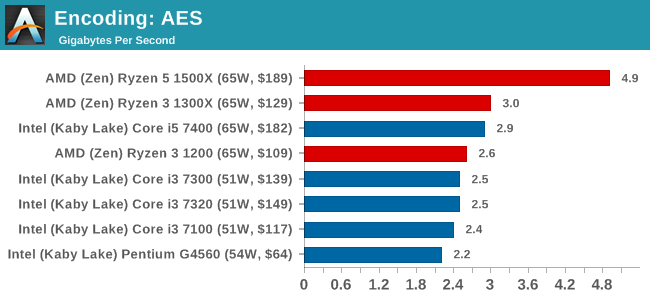
HandBrake v1.0.2 H264 and HEVC: link
As mentioned above, video transcoding (both encode and decode) is a hot topic in performance metrics as more and more content is being created. First consideration is the standard in which the video is encoded, which can be lossless or lossy, trade performance for file-size, trade quality for file-size, or all of the above can increase encoding rates to help accelerate decoding rates. Alongside Google's favorite codec, VP9, there are two others that are taking hold: H264, the older codec, is practically everywhere and is designed to be optimized for 1080p video, and HEVC (or H265) that is aimed to provide the same quality as H264 but at a lower file-size (or better quality for the same size). HEVC is important as 4K is streamed over the air, meaning less bits need to be transferred for the same quality content.
Handbrake is a favored tool for transcoding, and so our test regime takes care of three areas.
Low Quality/Resolution H264: He we transcode a 640x266 H264 rip of a 2 hour film, and change the encoding from Main profile to High profile, using the very-fast preset.
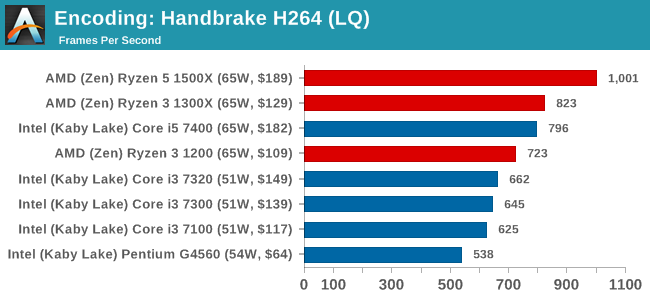
High Quality/Resolution H264: A similar test, but this time we take a ten-minute double 4K (3840x4320) file running at 60 Hz and transcode from Main to High, using the very-fast preset.
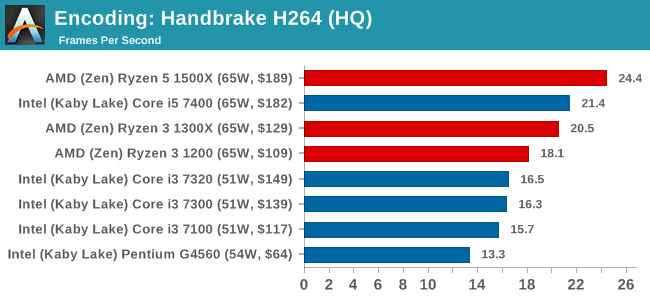
HEVC Test: Using the same video in HQ, we change the resolution and codec of the original video from 4K60 in H264 into 4K60 HEVC.
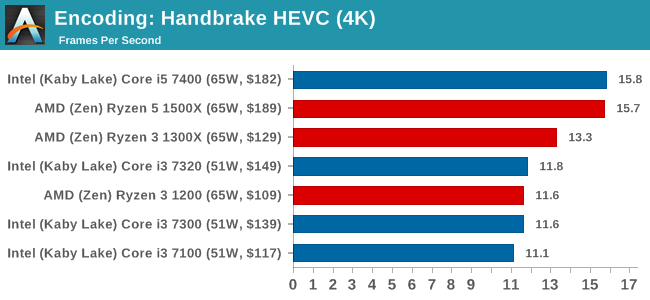










140 Comments
View All Comments
Oxford Guy - Thursday, July 27, 2017 - link
"The Ryzen 3 1200 brings up the rear of the stack, being the lowest CPU in the stack, having the lowest frequency at 3.1G base, 3.4G turbo, 3.1G all-core turbo, no hyperthreading and the lowest amount of L3 cache."That bit about the L3 is incorrect unless the chart on page 1 is incorrect. It shows the same L3 size for 1400, 1300X, and 1200.
Oxford Guy - Thursday, July 27, 2017 - link
And this:"Number 3 leads to a lop-sided silicon die, and obviously wasn’t chosen."
Obviously?
Oxford Guy - Thursday, July 27, 2017 - link
"DDR4-2400 C15"2400, really — even though it is, obviously, known that Zen needs faster RAM to perform efficiently?
Joel Hruska managed to test Ryzen with 3200 speed RAM on his day 1 review. I bought 16 GB of 3200 RAM from Microcenter last Christmastime for $80. Just because RAM prices are nuts right now doesn't mean we should gut Ryzen's performance by sticking it with low-speed RAM.
Oxford Guy - Thursday, July 27, 2017 - link
"This is also typically run at JEDEC subtimings where possible. It is noted that some users are not keen on this policy"Maybe you guys should rethink your logic.
1) You have claimed, when overclocking, that it's not necessary to do full stability testing, like with Prime. Just passing some lower-grade stress testing is enough to make an overclock "stable enough".
2) Your overclocking reviews have pushed unwise levels of voltage into CPUs to go along with this "stable enough" overclock.
So... you argue against proof of true stability, both in the final overclock settings being satisfactorily tested and in safe voltages being decided upon.
And — simultaneously — kneecap Zen processors by using silly JEDEC standards, trying to look conservative?
Please.
Everyone knows the JEDEC standard applies to enterprise. Patriot is just one manufacturer of RAM that tested and certified far better RAM performance on B350 and A320 Zen boards. You had that very article on your site just a short time ago.
Your logic doesn't add up. It is not a significant enough cost savings for system builders to go with slow RAM for Zen. The only argument you can use, at all, is that OEMs are likely to kneecap Zen with slow RAM. That is not a given, though. OEMs can use faster RAM, like, at least, 2666, if they choose to. If they're marketing toward gamers they likely will.
Oxford Guy - Thursday, July 27, 2017 - link
"Truth be told I never actually played the first version, but every edition from the second to the sixth, including the fifth as voiced by the late Leonard Nimoy"You mean Civ IV.
Oxford Guy - Thursday, July 27, 2017 - link
And, yeah, we can afford to test with an Nvidia 1080 but we can't afford to use decent speed RAM.Yeah... makes sense.
Hixbot - Thursday, July 27, 2017 - link
Are you having a conversation with yourself? Try to condense your points into a single post.Oxford Guy - Friday, July 28, 2017 - link
I don't live in a static universe where all of the things I'm capable of thinking of are immediately apparent, but thanks for the whine.Manch - Friday, July 28, 2017 - link
Really snowflake? You're saying he is whining? How many rants have you posted? LOL The difference between 2400 and 3200 shows up more on the higher end processors bc bigger L3 & HT err SMT. The diff in CPU bound gaming is 5-10% at most with the Ryzen 7's. Smaller with the 5's. Even more so with the 3's. Small enough to the point that it would not change the outlook on the CPU's. Also consider that if Ian change the parameters of his test constantly it would also skew numbers more so and render bench unreliable. Test the Ryzen 7's with 2133 then the 5's with 2400 then the 3's with 3200? Obviously anandtechs test are not the definitive performance bench mark for the world. What it is, is a reliably consistent benchmark allowing you to compare diff cpus with as little changed as possible as too not skew performance. Think EPA gas mileage stickers on cars. Will you get that rating? maybe. What it does is it gives you comparative results. From there its fairly easy to extrapolate the difference. Now I'm sure they will as they have in the past update there baseline specs for testing. You're running off the rails about how much the memory effects are. Look at all the youtube vids and other reviews out there. Difference yes. A lot? meh I also believe anandtech has mentioned doing a write up on the latest agesa update since its had a significant impact(including memory) on the series.Oxford Guy - Friday, July 28, 2017 - link
"You're saying he is whining? How many rants have you posted?"Pot kettle fallacy.